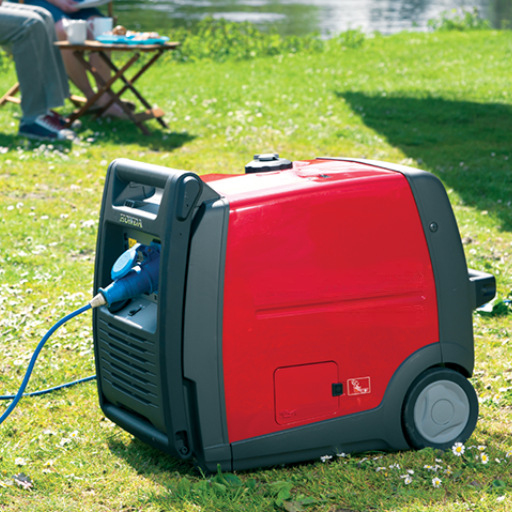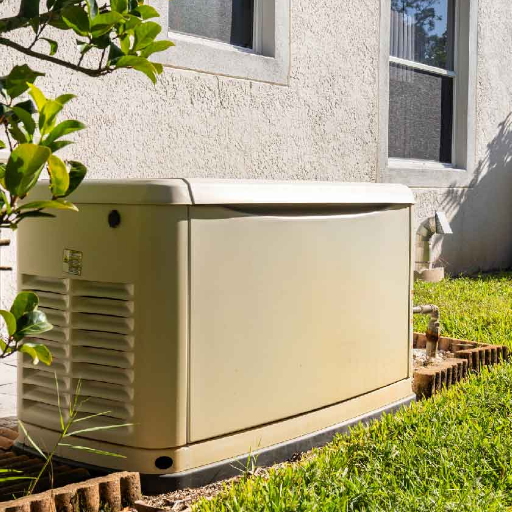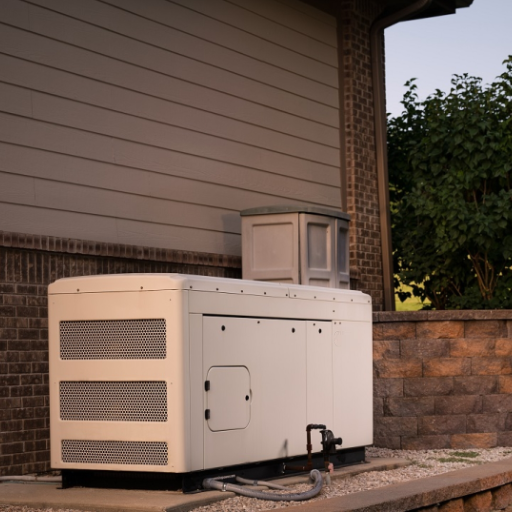Whole-house generators can be the perfect solution when one is dead set on keeping the lights on and running the home during emergencies, but the fact of the matter is, it is not always a bang-for-the-buck investment. Nevertheless, the pitfall that causes financial worry for many homeowners is the “How much will it cost?” question. The price of home generators can vary widely and is mainly determined by size, features, and installation needs. Knowing these costs is the most essential part of the process, as they will guide your choices in line with your home’s needs and budget. In this blog post, we’ll break the bank for you and beyond the front fees; we’ll also provide the outlook of the recurring costs you should expect. Whereas other costs go unnoticed until they arise, the cost of installing and operating the generator is a given. Over time, whether or not the generator pays off, one will feel the value. How the installation & power wiring are done will affect the installation costs. Before discussing the costs of running, however, it is good to know that when the grid is down —which is the primary reason for getting a generator —the generator also consumes a considerable amount of fuel, which is reflected in the fuel cost.
Overview of Home Generators
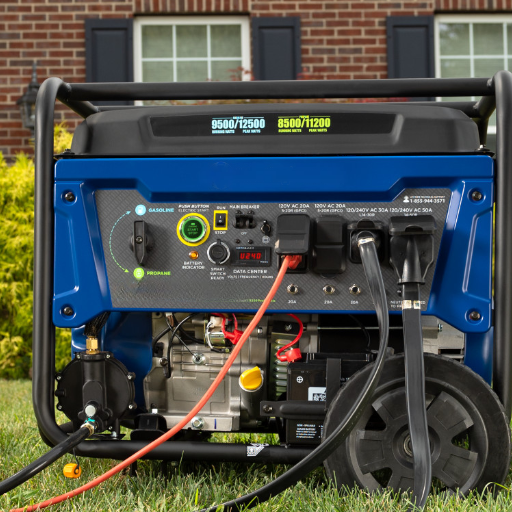
Home generators are equipment that lets you have back-up power in times of unexpected power cuts, which in turn keeps your house’s essential utilities running. As for their configurations, you can find several types of generators; however, the two main ones are portable and standby generators. The most affordable and flexible option is a portable generator, but it’s the most labor-intensive to set up, and you have to keep refilling the fuel regularly. The other primary option, standby generators, however, after being permanently installed, work automatically during a failure. They are either natural gas or propane-powered. Choosing a generator depends on your needs, financial situation, and preference for ease or maintenance.
What is a Home Generator?
A home generator is an alternative energy source that provides electrical power to your home during power outages. The main advantage of using these devices is maintaining the operation of indispensable electrical devices like refrigerators, heaters, and medical equipment when the main power supply is cut off. There are various types of home generators, with modern equivalents that include high-tech features such as automatic transfer switches and remote monitoring devices. The sources of power for home generators are gasoline, propane, natural gas, or diesel, which makes them very handy and suitable for every kind of household. Investing in a home generator will eliminate worries about electricity, ensure its availability, and serve as your safety net against life’s unpredictability.
Types of Home Generators
| Type | Fuel Source | Power Capacity | Key Features | Ideal Use Case |
|---|---|---|---|---|
| Portable Generator | Gasoline, Diesel | 1,000-10,000 watts | Easy transport, manual start | Camping, small appliances |
| Standby Generator | Natural Gas, Propane | 7,000-50,000+ watts | Automatic backup, permanent setup | Whole-home power |
| Inverter Generator | Gasoline, Propane | 1,200-4,000 watts | Quiet, energy-efficient | Electronics, RVs |
| Solar Generator | Solar Panels | 500-2,000+ watts | Eco-friendly, battery storage | Low-power, off-grid usage |
| Dual-Fuel Generator | Gasoline, Propane | 3,000-12,000 watts | Flexible fuel options | Power tools, emergencies |
| Diesel Generator | Diesel | 10,000-50,000+ watts | High durability, fuel-efficient | Industrial, large homes |
Benefits of Installing a Whole House Generator
Reliable Backup Power
A whole-house generator provides a steady, controllable source of backup power during outages to your home. These generators range from 10,000 to 50,000+ watts and can power the whole house, including essential appliances.
Seamless Power Transition
Modern entire home standby power generators come with automatic transfer switches, which are enabled to detect a power cut and kick in the generator right away, thus reducing downtime and keeping annoyances to a minimum.
Protection for Sensitive Electronics
These generators are very good at providing clean, stable power, offering a reliable backup for electronic devices such as computers, TVs, and medical equipment against various types of surges and fluctuations.
Fuel Efficiency and Options
Whole-house generators can run on a variety of fuels, including natural gas, propane, or diesel. One of the models, called The Dual-Fuel Generator, allows the user to switch between fuels based on availability and cost.
Weather Resilience
The weather, which causes power grid breakdowns, can be devastating, especially when events such as hurricanes, snowstorms, and heatwaves strike. It all changes with a whole-house generator, which will keep your home’s temperature and lighting normal even in extreme conditions.
Increase in Home Value
The use of a generator at home is always a sign that the property owner is security- and convenience-conscious; thus, the property attains a higher value and is an easy selling proposition from the new owner’s point of view.
Cost of Home Generators
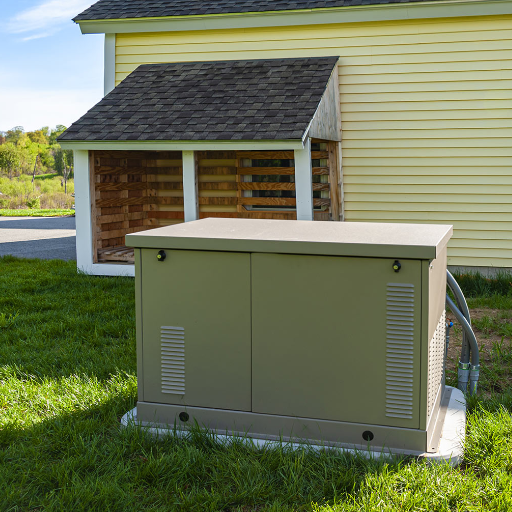
The price of a residential generator can vary widely depending on the type, capacity, and optional modules. Usually, the most economical kind of generator is a portable one, priced from $500 to $2,000. With automatic, more reliable power backup, standby generators are usually more expensive, costing $2,000 to $10,000, excluding installation. An additional $2,000 to $5,000 is required for the stand-by generator installation. It is a smart move to consider generator maintenance and fuel costs, along with the generator’s price, when making the budget. The best way to get a cost estimate is to consult a licensed contractor or a generator specialist.
Average Cost of Different Generator Types
The prices can differ significantly, regardless of the choice or quality of the generator purchased. In general, portable generators cost between $300 and $ 1,500 and are often the most budget-friendly option. These are best for situations when you need power for a short period or when the power requirement is not very high, e.g., outdoor events or minor home backup. In contrast, very efficient, quiet inverter generators are typically priced between $500 and $4000. They are perfect for electronics and appliances that are very sensitive to power supply quality because they provide a stable power output at all times.
If a more comprehensive and sustainable power supply is needed, power generators ready for use and waiting for such a situation are still the best possible choice for supplying a whole house or business with power. The prices of the mentioned units start from around $2,000 and can go up to $10,000, and that is not all; there is also the cost of installing the unit, which might range from $2,000 to $5,000 or more. Even the choice of the fuel, like diesel, propane, or natural gas, might have an impact on the price that you will pay immediately, as well as the cost that will be reflected in running the generator in the long term. Keeping in mind your establishment’s exact power requirements, seek at least one expert opinion on the most suitable, budget-friendly, and dependable generator type for your establishment.
Factors Influencing Generator Cost
Power Output Requirements
The generator’s wattage capacity is a significant factor that affects the price. The smaller portable generators suitable only for a few electrical appliances are often sold at prices within reach of many, while the larger standby generators designed to power the whole home or business carry a higher price tag. It is essential to calculate in advance how many watts you will need—these large-capacity generators not only cost more to place but can also be more expensive to operate.
Brand and Quality
Well-known companies trusted for their high-quality, long-lasting products usually charge higher prices. However, these reputable businesses also offer excellent warranties and customer service. It is therefore necessary to compare the available products and select the one that, in addition to having a strong brand reputation, is best suited to your needs.
Fuel Efficiency and Type
Propane and natural gas generators might require a larger initial investment than gasoline or diesel models. But, they might still be the economical choice in the long run if the cost and supply of fuel in your area make their use feasible and considerably cheaper. Moreover, models with high fuel efficiency will result in lower operating costs, giving you a reason to choose the one that uses less for longer.
Additional Features
Modern-day generators are equipped with features such as remote monitoring, automatic transfer switches, and noise-reduction systems. These features not only improve operational ease and efficiency but also increase costs. Make a list of your non-negotiable features before you buy the generator.
Installation and Maintenance Costs
More powerful generators, particularly those used as backup sources, should be installed by professionals, which increases the total cost. Besides, there should be an annual budget to cover maintenance costs, such as oil changes and parts repairs. Comparing models in terms of maintenance needs is a piece of advice for those looking for the most economical solution over the long term.
Generator Installation
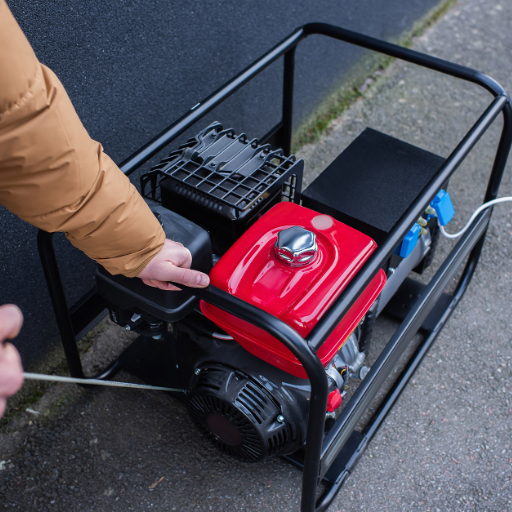
In the electricity industry, installing a generator must be carefully planned to avoid safety and efficiency risks. Here are the common steps:
Choose an Appropriate Location
The generator should be kept in a well-ventilated outdoor area of the building and must be at least 5 feet away from entrances, windows, and vents to prevent CO from being blocked.
Prepare the Foundation
The generator should be installed on a level, stable surface, such as a concrete pad, to keep it firmly in place and protected.
Connect to the Power Source
The use of a transfer switch is the recommended and legal mechanism for connecting a generator to the electrical supply system. This will ensure that backfeeding is stopped, preventing potential hazards to utility workers and the public.
Hire a Professional
Seek an electrician who carries a license or a professional who installs generators so that he can assist you in all the procedures related to electricity and the local code, which will definitely be done when he is in charge.
Test and Maintain
For the first three years, you will need to consult the generator to ensure it has been set up correctly. Moreover, you need to perform periodic maintenance, such as oil changes and filter checks.
It is necessary to follow the manufacturer’s instructions and the local laws during the generator installation. Contact professional personnel if you are not sure of the proper installation to safeguard against different risks.
Average Installation Cost for Whole Home Generators
The installation costs for an entire-home generator can vary based on many factors, including the generator size, labor, and regional pricing differences. The average homeowner can expect to pay anywhere between $5,000 and $12,000. This is the price of a generator, whose usual value is $3,000-$7,000, plus additional expenses for electrical work, permits, and materials, all included.
Labor costs are not to be underestimated and typically range from $1,000 to $3,000 per installation, depending on area rates and the complexity of your installation. More expensive generators often require more elaborate setups, which can, in turn, increase labor costs. More importantly, municipalities usually require specific permits, and the price can vary from $100 to $500. All these factors force homeowners to be more cautious and to consider all the related costs when planning a whole-home generator installation.
Factors Affecting Installation Costs
The cost of installing a whole-home generator may vary widely due to several key factors. Generative size and output power are seen as two main factors, because larger units, which are designed to supply power to the whole house, tend to have higher installation costs and a greater share of initial expenses. It is also a crucial matter, how sophisticated is the electricity system in your house, as additional labor and materials will be needed for older or non-standard installations.
The place also plays a significant role in the expenses. Labor and permit costs can vary widely across regions. Places with a high labor rate or those that require more permits might see an increase in overall costs. Another consideration is the distance between the generator and your house’s power panel, which can also drive up the price, as longer distances require more wiring and conduit. The preparation of the site, such as installing the concrete pad or making landscaping changes, may also contribute to the total costs, which will depend on the relief and conditions of the area. Sifting through these aspects can help you forecast costs more precisely and plan the budget effectively.
Choosing the Right Installer for Your Generator
If you’re looking for someone to install a generator, consider the one who’s most knowledgeable, reliable, and delivers the highest-quality work. The first thing you should do is make sure the person is licensed, insured, and trained to work with the specific type and brand of generator you want. Look for certificates issued by the generator manufacturer, as they clearly indicate that the person has been trained and has specialized knowledge. The installer’s experience can be reflected in customer reviews, ratings, etc. A request for a complete estimate can also give you an idea about the costs transferred to you. Additionally, inquire with the installer whether any support, up to and including maintenance services or warranties, will be provided to protect your investment. So, thorough research and assessment will lead you to a well-thought-out decision and to a safe and efficient acquisition and installation of the generator.
Understanding Generator Size and Its Impact on Cost
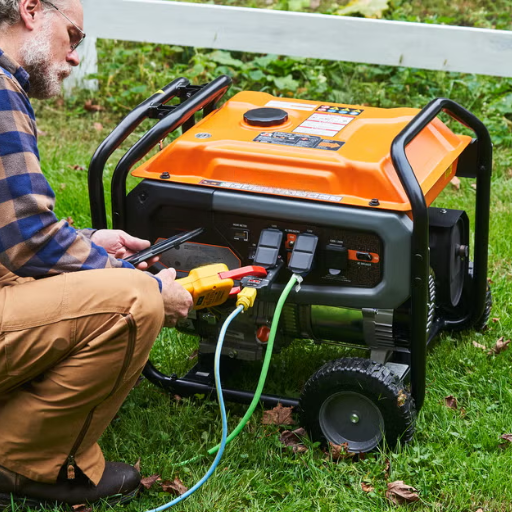
The cost of a generator depends on its size and whether it is the best choice for your needs. Bigger generators, powerful enough to serve a whole household or business, cost more due to their greater capacity and more advanced features. But the other way around, smaller generators designed for limited use are typically cheaper. The decision on the right size is based on your energy consumption; you have to figure out the total wattage of the appliances and systems that need to run during a power outage to decide on the perfect size. It is essential to note that an oversized generator can be avoided, but an undersized one may result in an insufficient power supply. So, matching the size with your needs is not only essential for money-saving but also a performance you can rely on.
How to Determine the Right Size Generator
Begin calculating the generator size accurately by compiling a list of essential equipment/appliances, and systems you want to keep running when the power goes off. For this purpose, you can add an air conditioner or alternative heating sources, a refrigerator, lights, and, if applicable, any medical devices. Each of these items usually has a wattage rating, which can be easily identified in the device’s documentation or even on the device itself. After the total wattage of all simultaneously used appliances has been summed, the user should also account for additional surge wattage for appliances that may require greater power input when turned on, such as refrigerators and split air conditioners.
It is recommended that you consider a safety buffer (typically 10-20% above the calculated needs) for connected loads before you use our Generator Sizing Calculator to help you predetermine your energy needs. Generators are rated by their power output in watts; thus, shop for one offering more than the total requirement for smooth operation. For instance, a 6,000-watt generator would be a good pick for a total of 5,000 watts. Also, choosing between a portable and a standby generator should be based on the standby generator being the better of the two for endurance, and the portable one for more specific, lighter loads. Your in-depth knowledge of power consumption requirements will ensure you choose a generator that is not only efficient but also reliable.
Cost Implications of Different Generator Sizes
Various factors, including generator output capacity, fuel type, and other features, determine the cost implications of different generator sizes. More specifically, the smaller portable generators, which usually have an output capacity of 2,000 to 5,000 watts, are the cheaper option, with the lowest price at $500 and the highest at $1,500. They are designed to be adequate for an average user. Generators are the best option for essential appliances or tools during short-term outages.
On the other hand, larger standby generators with a capacity of 10,000 watts or more come with a much higher price tag. The cost of these machines usually starts at $3,000 and can go as high as $10,000, particularly if the price includes installation and transfer switches. Nevertheless, these models are a sound and cost-effective choice for larger households or corporations that demand a high level of power, as they ensure a smooth, quick supply of electricity during extended power outages.
Furthermore, the fuel fee and the long-term affordability it offers, while being environmentally friendly, will depend on the type of fuel used. While gasoline-fed turbines are usually cheaper upfront, they can cost users more in the long run. On the other hand, propane and natural gas generators, which are often more expensive initially, do, however, represent a long-term cheaper and cleaner energy solution. Thus, including these aspects in your evaluation will also help you measure the actual cost of the generator you eventually choose.
Whole Home vs. Portable Generators
| Parameter | Whole Home Generators | Portable Generators |
|---|---|---|
| Power Output | High, powers entire home | Limited, powers select appliances |
| Installation | Permanent, professional installation needed | Temporary, easy to set up manually |
| Cost | Expensive upfront and maintenance | Affordable upfront cost |
| Fuel Source | Natural gas or propane | Gasoline or propane |
| Noise Level | Quiet operation | Typically louder |
| Portability | Fixed, non-movable | Fully portable, movable |
| Backup Duration | Long-term supply | Shorter runtime |
| Maintenance | Periodic professional check | Easier, DIY-friendly maintenance |
| Suitability | Ideal for large households and businesses | Best for small-scale power needs |
| Weather Resistance | Designed for all weather conditions | May require protective covering |
Financing Options for Home Generators
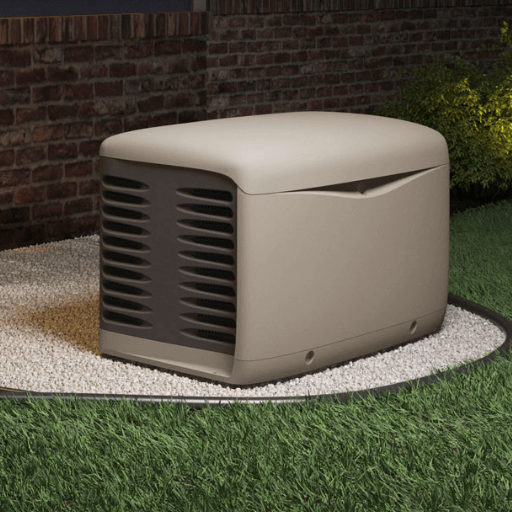
Getting a home generator may require a reasonable payment, but different financing options may make it easier to get one. Below are the best-known options:
Manufacturer Financing Plans
Many generator manufacturers offer installment payments and fixed interest rates, which are major attractive features of these plans. There are times when these plans come with different promotional offers, such as low or even zero-interest financing for a specific period.
Retailer Financing
There are times when some shopkeepers team up with financial service providers to offer financing options that buyers can use when they get to the store. Sometimes these programs may include a lack of payment, an interest-free duration, or different terms and conditions.
Personal Loans
Personal loans, commonly issued by banks or credit unions, are a source of funds that can be used to get a generator. The characteristics of such loans include interest rates that may be higher than those of the manufacturer, but they will be more convenient for the borrower, as they can use the loan for any other purpose as well.
Home Equity Loans or Lines of Credit (HELOC)
The possibility of homeowners who can pay for the generator upfront is also to consider borrowing against their home equity. The options for unsecured loans in this case might offer lower interest rates, but the only hindrance is the house being used as collateral by the loan taker.
Credit Cards
When it comes to financing a home generator, using a credit card offers the most convenience, but always remember that it is a good idea to pay the debt back quickly, as interest rates can be very high.
You will need to compare and analyze, and it is mandatory to examine the terms, interest rates, and repayments before deciding which option best fits your financial situation. You will be asked to read the terms and conditions carefully and to confirm that the monthly payments are as per your monthly budget.
Budgeting for Your Whole Home Generator
You’ll need to take into account the purchase and installation costs, as well as other yardsticks for the generator’s performance, to determine the total cost of a whole-home generator. Buying a top-notch whole-home generator can cost between $2,000 and $10,000, depending on the type, power output, and brand. The installation process may require you to pay an additional $3,000 to $6,000, as you need a certified electrician to ensure the connection to your house’s electrical system is installed correctly.
In addition, you should allocate some dollars to generator operation, such as maintenance, which can cost $200 to $500 per year, to ensure the generator runs as new. Among the many types of fuel the generator might use—natural gas, propane, or diesel —the one that powers it is the main expense in the generator’s operating budget. The generator typically has a lifespan of 10-20 years, so the total cost should cover the cost of any formal repairs or a new generator in the future.
One way to do this would be to anticipate your energy requirements so that the appropriate generator size is selected, while at the same time avoiding unnecessary power expenses, which could be the main strain on your budget. In addition, a proper analysis of these factors is the first step toward a clear financial plan and, hence, toward what you can do to avoid costs.
Long-term Cost Savings with Whole House Generators
Investing in a whole-house generator can result in substantial long-term savings by avoiding the burden of grid reliance during blackouts and protecting your home from potential damage from sudden power failures. For example, the data available suggests that a prolonged power outage can cause food spoilage, damage to appliances, and even frozen pipes during winter due to a breakdown in water circulation. All these can cost you a lot of money to fix. Whole-house generators ensure a steady, smooth power supply, thereby averting these costs. Furthermore, new generators are being built to be environmentally friendly, as technological advancements have reduced fuel consumption and maintenance needs, so the cost of operation will go down in the long run. This combination of reliability and efficiency converts whole-house generators into an excellent financial option for property owners.
Reference Sources
Economic Design of Hybrid Pico-Hydraulic/Photovoltaic Generation System: A Case Study in Egypt
Summary: This paper examines the economic feasibility of hybrid renewable energy systems, including solar and hydraulic generators, for residential use. It highlights cost savings and energy efficiency as key benefits.
Operation of Biogas-Solar-Diesel Hybrid Renewable Energy System with Minimum Reserved Energy
Summary: This research investigates the operation of hybrid energy systems combining biogas, solar, and diesel generators. It evaluates the capital and operational costs of these systems in rural settings.
Frequently Asked Questions (FAQs)
Generator Installation Cost: What Should I Expect?
The price of installing a household generator can be quite variable, due to several factors that ultimately determine the cost. In the final analysis, as always, the mentioned factors bracket house size and the preferred generator type. She/he/it also stated that while the one that is no more than portable may not be the most expensive, it can still be quite handy because it provides backup power for the whole house. The dealer estimates the average cost of installing a whole-home generator to be between $5,000 and $ 15,000, from which you can also get the necessary parts and accessories.
How Much Do Whole House Generators Cost?
The cost of a whole-house generator can vary depending on the size of your home and the generator’s power output. A typical generator, such as a Generac 20kW unit that would power the entire house, might cost $10,000 to $15,000 or more when installation is included. The home generator installation entails not only the unit purchase but also the necessary electrical work to ensure it connects smoothly to your home’s power system. Furthermore, if you go for a generator powered by natural gas, the installation cost might include running gas lines, which could add to the total expense. Do weigh the cost assessment against the benefit of having a reliable backup power source for an extended period of time.
What Is the Typical Cost of a Generator System?
The price of a generator system can vary widely, depending on the generator’s size and features. For example, the cheapest generator can cost about $2,000, whereas the more complex ones installed in homes can range from $5,000 to $15,000 or more. Additionally, the total price depends on installation costs, fuel type, and power output. The total price can also increase due to maintenance costs and any mandatory permits. In the end, one has to consider the long-term savings from having a reliable, convenient backup power source.
How to Safely Operate a Generator?
Make sure you read all the tips to run your power source safely and get the best out of it. In the first place, always take the instruction leaflet and read it carefully, as it contains all the information for your generator model. The generator’s source needs to be positioned outside the house, far from windows and doors, to prevent carbon monoxide accumulation. Adding fuel to the generator should be done by an adult with knowledge of how to do so. Inside the generator, it should be off, and the correct type of fuel should be used at all times to avoid potential fires. Time-to-time checks, like oil inspections and making sure the battery is kept charged, are small actions that help keep a generator running smoothly.



